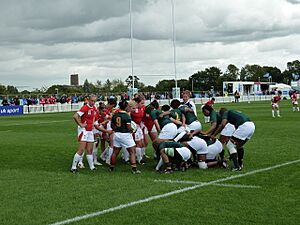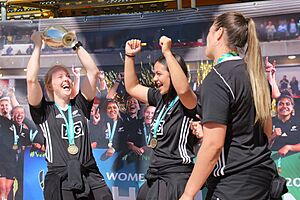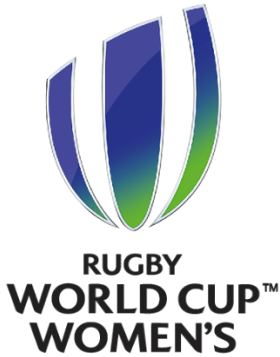Women's Rugby World Cup facts for kids
| Current tournament |
|

Rugby World Cup logo
|
|
| Sport | Women's rugby union |
|---|---|
| Instituted | 6 April 1991 |
| Number of teams | 12; 1991 — 1994 & 2006 — 2021 16; 1998 — 2002 & 2025 |
| Regions | Worldwide (World Rugby) |
| Holders | England (3rd title) |
| Most titles | New Zealand (6 titles) |
The Women's Rugby World Cup is a super exciting women's rugby union tournament. It's like the Olympics for women's rugby teams from all over the world! World Rugby organizes this big event.
The very first Women's Rugby World Cup happened in 1991. At first, it wasn't officially supported by the main rugby board. But by 1998, it got full official backing. Later, the 1991 and 1994 tournaments were also officially recognized.
This amazing competition usually takes place every four years. The 2021 tournament was moved to 2022 because of the COVID-19 pandemic, but it was still called the 2021 event. So far, three countries have won this cup. New Zealand has won it a record six times, showing how strong they are! England won the most recent tournament in 2025.
Contents
History of the Women's Rugby World Cup
The Start of Women's Rugby World Cup
Before the official Women's Rugby World Cup began, there were a few similar tournaments. One of the first was in New Zealand in 1990. It was called the "World Rugby Festival for Women." Teams from the United States, Netherlands, Russia, and host New Zealand played. New Zealand won that festival!
The first tournament actually called the Women's Rugby World Cup happened in 1991 in Wales. Twelve countries competed. The United States surprised everyone by winning the first championship! They beat England 19-6. After this, it was decided to hold the tournament every three years for a while, to match up with the men's World Cup.
The next tournament in 1994 was supposed to be in Amsterdam but moved to Scotland. Eleven teams played. This time, England won, beating the United States in the final.
In 1998, the tournament finally got official support from the International Rugby Board (now World Rugby). Amsterdam hosted this big event, with a record sixteen teams competing. New Zealand joined in and won their first World Cup title, beating the United States.
Champions Through the Years
Spain hosted the tournament in 2002. New Zealand won again, beating England 19-9. In 2006, the World Cup went to Edmonton, Canada. This was the first time a major women's rugby tournament was held in North America. New Zealand won their third title in a row, again defeating England!
Many countries wanted to host the 2010 World Cup. England was chosen, and the games were played in London. New Zealand continued their winning streak, taking home their fourth title.
The 2017 World Cup took place in Ireland. Games were played in Dublin and Belfast. This tournament happened a year earlier than usual to better fit with the Summer Olympics. New Zealand won again, making it their fifth title!
In 2019, World Rugby decided to call the women's championship simply "Rugby World Cup" starting in 2021. They wanted to show that women's rugby is just as important as men's rugby. This was a big step for gender equality in sports!
The 2021 tournament, planned for New Zealand, was moved to 2022 because of the COVID-19 pandemic. It was still called the 2021 Rugby World Cup. New Zealand won this tournament, their sixth title!
The 2025 competition expanded to include 16 teams, up from 12. England hosted the 2025 tournament. Australia and the United States are set to host the next two women's tournaments in 2029 and 2033. This is exciting because it means both the men's and women's World Cups will be held in the same countries around the same time! England won the 2025 tournament, making it their third title.
In October 2023, World Rugby decided to change the names again. Starting in 2025, the women's tournament is once more called the "Women's Rugby World Cup." The men's tournament will be called the "Men's Rugby World Cup" from 2027. This change helps everyone know which tournament is which.
Amazing Records and Winners
Many incredible players have set records in the Women's Rugby World Cup!
Player Records
- Emily Scarratt from England has the most points ever in World Cup games, with 175! She also scored 70 points in one tournament in 2014.
- Magali Harvey from Canada scored 41 points in a single match in 2017. That's a lot of points!
- Kendra Cocksedge from New Zealand made 13 conversions in one game.
- Her teammate, Portia Woodman-Wickliffe, scored 8 tries in a single match in 2017. Portia also holds the record for most tries in one tournament (13) and in her whole World Cup career (20 tries).
- Only a few drop goals have been scored in the tournament's history, showing how rare they are!
- In the 2025 World Cup, Braxton Sorensen-McGee (New Zealand) and Julia Schell (Canada) both scored two "hat tricks" (three tries in a game). Julia Schell even scored six tries in one match against Fiji!
Team Records
- The game between New Zealand and Germany in 1998 set many records. New Zealand won 134-6! This was the highest score by one team (134 points) and the biggest winning difference (128 points).
Tournament Winners and Hosts
| Ed. | Year | Host | First place game | Third place game | Num. teams |
||||
|---|---|---|---|---|---|---|---|---|---|
| Score | Score | Fourth | |||||||
| 1 | 1991 | United States |
19–6 Cardiff Arms Park, Cardiff |
England |
France |
Shared | New Zealand |
12 | |
| 2 | 1994 | England |
38–23 Edinburgh Academicals, Edinburgh |
United States |
France |
27–0 Edinburgh Academicals, Edinburgh |
Wales |
12 | |
| 3 | 1998 | New Zealand |
44–12 NRCA Stadium, Amsterdam |
United States |
England |
31–15 NRCA Stadium, Amsterdam |
Canada |
16 | |
| 4 | 2002 | New Zealand |
19–9 Olympic Stadium, Barcelona |
England |
France |
41–7 Olympic Stadium, Barcelona |
Canada |
16 | |
| 5 | 2006 | New Zealand |
25–17 Commonwealth Stadium, Edmonton |
England |
France |
17–8 Commonwealth Stadium, Edmonton |
Canada |
12 | |
| 6 | 2010 | New Zealand |
13–10 Twickenham Stoop, London |
England |
Australia |
22–8 Twickenham Stoop, London |
France |
12 | |
| 7 | 2014 | England |
21–9 Stade Jean-Bouin, Paris |
Canada |
France |
25–18 Stade Jean-Bouin, Paris |
Ireland |
12 | |
| 8 | 2017 | New Zealand |
41–32 Ravenhill Stadium, Belfast |
England |
France |
31–23 Ravenhill Stadium, Belfast |
United States |
12 | |
| 9 | 2021 | New Zealand |
34–31 Eden Park, Auckland |
England |
France |
36–0 Eden Park, Auckland |
Canada |
12 | |
| 10 | 2025 | England |
33–13 Twickenham Stadium, London |
Canada |
New Zealand |
42–26 Twickenham Stadium, London |
France |
16 | |
| 11 | 2029 | To be determined | To be determined | 16 | |||||
| 12 | 2033 | To be determined | To be determined | 16 | |||||
Team Performance Records
| Team | Champions | Runners-up | Third place | Fourth place | Total top 4 |
|---|---|---|---|---|---|
| 6 (1998, 2002, 2006, 2010, 2017, 2021) | – | 2 (1991, 2025) | – | 8 | |
| 3 (1994, 2014, 2025) | 6 (1991, 2002, 2006, 2010, 2017, 2021) | 1 (1998) | – | 10 | |
| 1 (1991) | 2 (1994, 1998) | – | 1 (2017) | 4 | |
| – | 2 (2014, 2025) | – | 4 (1998, 2002, 2006, 2021) | 6 | |
| – | – | 7 (1991, 1994, 2002, 2006, 2014, 2017, 2021) | 2 (2010, 2025) | 9 | |
| 1 (2010) | 1 | ||||
| – | – | – | 1 (1994) | 1 | |
| – | – | – | 1 (2014) | 1 |
Participating Nations Over Time
| Team | 1991 |
1994 |
1998 |
2002 |
2006 |
2010 |
2014 |
2017 |
2021 |
2025 |
2029 |
2033 |
|---|---|---|---|---|---|---|---|---|---|---|---|---|
| – | – | 5th | 7th | 7th | 3rd | 7th | 6th | 6th | 8th | Q | ||
| – | – | – | – | – | – | – | – | e | 15th | |||
| 5th | 6th | 4th | 4th | 4th | 6th | 2nd | 5th | 4th | 2nd | Q | ||
| 2nd | 1st | 3rd | 2nd | 2nd | 2nd | 1st | 2nd | 2nd | 1st | Q | ||
| – | – | – | – | – | w | – | e | 9th | 12th | |||
| 3rd | 3rd | 8th | 3rd | 3rd | 4th | 3rd | 3rd | 3rd | 4th | Q | ||
| – | w | 14th | 16th | – | e | – | – | – | – | |||
| – | – | – | e | e | e | e | 12th | w | e | |||
| – | 7th | 10th | 14th | 8th | 7th | 4th | 8th | e | 5th | |||
| 8th | w | 12th | 12th | – | e | e | 9th | 5th | 10th | |||
| 11th | 8th | – | 13th | e | e | e | 11th | 12th | 11th | |||
| – | 9th | 9th | 11th | 11th | 11th | 12th | – | e | e | |||
| 7th | w | 13th | 15th | – | e | e | e | e | e | |||
| 3rd | w | 1st | 1st | 1st | 1st | 5th | 1st | 1st | 3rd | Q | ||
| 11th | 11th | 16th | – | – | e | e | e | e | – | |||
| – | – | – | 9th | 10th | e | 11th | – | w | 16th | |||
| – | 5th | 6th | 6th | 6th | 8th | e | e | 10th | 7th | |||
| – | – | – | – | 12th | 10th | 10th | – | 11th | 6th | |||
| 6th | w | 7th | 8th | 9th | e | 9th | 10th | e | 14th | |||
| 10th | 10th | 15th | – | – | 12th | e | – | – | – | |||
| 1st | 2nd | 2nd | 5th | 5th | 5th | 6th | 4th | 7th | 9th | Q | ||
| 9th | 4th | 11th | 10th | – | 9th | 8th | 7th | 8th | 13th |
Q = nation qualified for Final Tournament not yet played
w = nation withdrew from (final) Tournament
e = nation eliminated in qualifying stage and did not reach Final Tournament
– = nation did not enter competition.
The following nations have participated in qualifying stages, but have never reached the Final Tournament:
e = nation eliminated in qualifying stage and did not reach Final Tournament
w = nation withdrew from qualifying stage
p = nation possibly eliminated in qualifying stage and will need to be successful in Repechage in order to reach Final Tournament
– = nation did not enter qualifying stage competition.
Debut of National Teams
| Year | Nation(s) | Total |
|---|---|---|
| 1991 | 12 | |
| 1994 | 3 | |
| 1998 | 2 | |
| 2002 | 1 | |
| 2006 | 1 | |
| 2010 | (none) | 0 |
| 2014 | (none) | 0 |
| 2017 | 1 | |
| 2021 | 1 | |
| 2025 | 1 | |
| 2029 | TBC | TBC |
Refereeing the Big Games
Here are the referees who have overseen the exciting final matches:
How the Tournament Works
The tournament format has changed a bit over the years. In 2006, 12 teams played in groups, and the best teams moved on to knockout rounds.
The 2010 and 2021 tournaments also had 12 teams. In 2021, they added quarter-finals, just like in the men's Rugby World Cup. For the 2025 tournament, the competition grew even bigger, with 16 teams competing!
The Special Trophy
A brand new trophy was created for the 2025 tournament in England. It was designed by Thomas Lyte, a famous silversmith in London. The trophy is made of shiny sterling silver and covered in 24-carat gold. It stands 38 centimeters tall and weighs 4.5 kilograms, just like the men's Rugby World Cup Trophy!
Watching the Games
The Women's Rugby World Cup has become much more popular over the last 15 years. More people watch it on TV and attend the games now.
In the United Kingdom, Sky Sports showed many live matches from the 2010 World Cup. This included the semi-finals and the final. From 2017 onwards, the games have been shown on free TV channels like ITV and the BBC.
In Ireland, the channel TG4 broadcast the 2014 World Cup. They received praise for showing all of Ireland's matches, plus the semi-finals and final. Many people in England, France, and the United States watched the knockout games in 2017.
See also
 In Spanish: Copa Mundial Femenina de Rugby para niños
In Spanish: Copa Mundial Femenina de Rugby para niños
- Rugby World Cup (men)
- Women's rugby union
- Women's international rugby
- Women's Rugby League World Cup
 | Isaac Myers |
 | D. Hamilton Jackson |
 | A. Philip Randolph |




